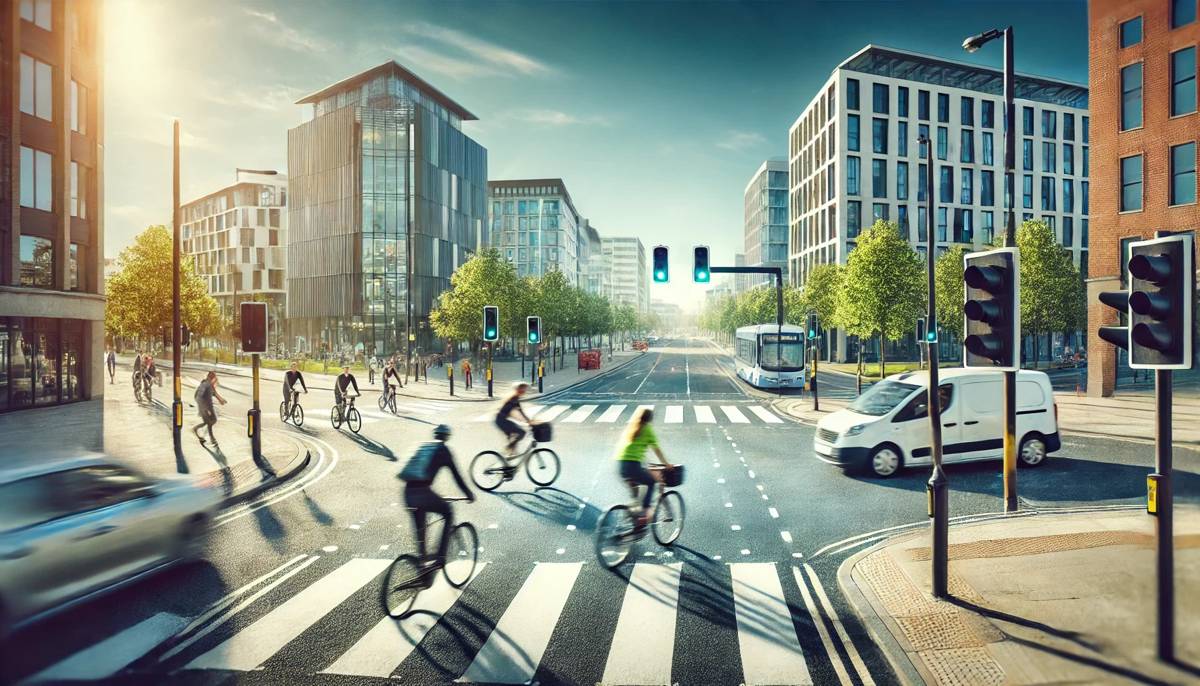A new era for Safer Cycling and Walking with AI-powered Sensor Technology
In a bold step towards safer streets, Solihull has become a testing ground for revolutionary smart sensor technology designed to enhance safety for cyclists and pedestrians. Installed along the A34 Stratford Road near Blythe Valley, this innovative tech promises to redefine how we navigate busy crossings, making them safer, more efficient, and less stressful for everyone on the move.
A Smarter Way to Cross
The West Midlands Combined Authority (WMCA), in collaboration with Transport for West Midlands (TfWM) and Solihull Council, has launched a trial of cutting-edge sensors developed by VivaCity. These aren’t just any sensors; they are part of a new generation of intelligent traffic management systems designed to prioritise active travel—cycling, wheeling, and walking—over traditional motor vehicle use.
The sensors installed at a toucan crossing near Blythe Valley detect cyclists 20-30 metres away, far earlier than conventional technology. This early detection triggers the traffic signals to switch to green faster, allowing cyclists to glide through crossings without the frustrating stop-start pattern that can discourage even the most seasoned riders. By facilitating smoother, more predictable journeys, this technology is set to boost cycling uptake and enhance safety.
Why This Technology Matters
The need for smarter, safer crossings has never been more apparent. As urban areas grapple with the dual challenges of increasing traffic congestion and a pressing need to reduce emissions, promoting active travel has become a key focus. Yet, a lack of safe infrastructure often holds people back from cycling or walking more frequently.
VivaCity’s sensors use intelligent video analytics and advanced algorithms to classify and differentiate users approaching the crossing—whether they’re cyclists, pedestrians, or mobility device users—without compromising privacy. The system accurately detects and anticipates the needs of each user, adjusting traffic signals in real-time to reduce waiting times and minimise the potential for collisions.
“Our aim is to set a new standard of road safety across the UK, including in the West Midlands,” said Peter Mildon, COO of VivaCity. “We’re excited to see our technology being used to support active travel initiatives in Solihull. Our smart sensors are specifically designed to enhance the efficiency and safety of road networks.”
A Broader Vision for Safer Streets
This trial is part of a wider strategy to make the West Midlands a leader in active travel, as outlined by Richard Parker, Mayor of the West Midlands and WMCA chair. “Road safety is a top priority for me, and I want everyone to feel secure when cycling or walking. This project gives us a chance to see how Artificial Intelligence can make our roads safer by detecting cyclists and pedestrians and managing traffic signals to give them more time to cross safely,” Parker noted.
The Mayor’s vision is clear: safer streets lead to healthier lifestyles, fewer traffic jams, and cleaner air. Encouraging more people to cycle or walk not only improves public health but also alleviates some of the region’s pressing environmental challenges. And with these smart sensors, the hope is to create a network of crossings that are more in tune with the needs of those choosing active travel.
How the Technology Works
VivaCity’s sensors represent a significant leap forward from traditional traffic detection methods. Here’s how they work:
- Early Detection: The sensors detect approaching cyclists from 20-30 metres away, allowing traffic lights to respond faster.
- Intelligent Classification: Using video analytics, the sensors differentiate between cyclists, pedestrians, and other road users, adjusting traffic signals accordingly.
- Anonymity and Privacy: The system operates without collecting personal data, ensuring user privacy while enhancing traffic flow and safety.
By responding dynamically to real-time conditions, these sensors are reducing waiting times and the risk of accidents, creating a more inviting environment for cyclists and pedestrians alike.
Setting a Precedent for Future Projects
This pilot project is the first of its kind in the region, and its success could set a precedent for similar initiatives across the UK. Solihull Council’s Cabinet Member for Environment and Infrastructure, Cllr Ken Hawkins, highlighted the council’s commitment to sustainable travel: “We want to do all that we can to encourage people to travel safely and sustainably across the borough. The new sensors will help make the Monkspath to Blythe Valley active travel route a more attractive option for cyclists so they can travel quickly but safely on this key route.”
With the potential to dramatically improve safety and efficiency on busy routes, the success of this trial could spur the adoption of similar technologies elsewhere, particularly in areas looking to reduce vehicle dependency and enhance quality of life for all road users.
The Broader Impact on Urban Mobility
At its core, this project is about more than just convenience; it’s about transforming how cities think about mobility. Encouraging active travel requires more than just dedicated bike lanes—it demands smart, responsive infrastructure that prioritises people over cars. By making cycling and walking safer and more efficient, these smart sensors are laying the groundwork for a shift towards more sustainable urban living.
For investors and policymakers, the success of this trial represents a compelling case for investing in smart city technologies that can deliver tangible benefits in terms of safety, sustainability, and public health. As cities around the world grapple with the challenges of congestion and climate change, Solihull’s approach could serve as a valuable blueprint.
A Positive Shift for the West Midlands
As the West Midlands continues to embrace innovation, this project is a promising step towards safer, greener streets. By championing advanced technologies like VivaCity’s smart sensors, Solihull is setting the stage for a future where active travel is not only encouraged but also genuinely prioritised. It’s an exciting time for the region, as the shift towards smarter, safer streets gains momentum.
With each cyclist detected and each safe crossing facilitated, the promise of a healthier, more sustainable future becomes a little brighter. And while this technology is just one piece of the puzzle, it’s a crucial one that could inspire similar initiatives across the UK and beyond.





























